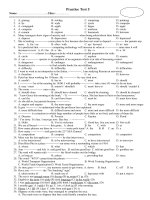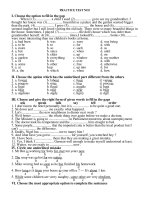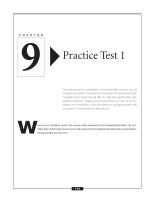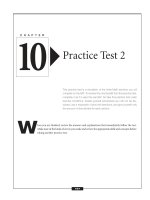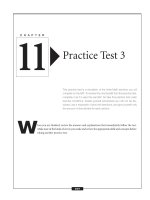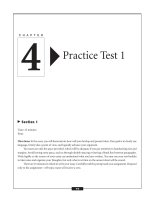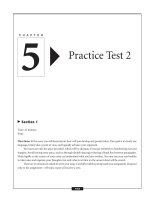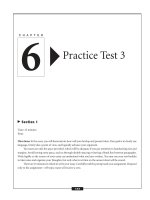Exam essentials proficiwncy practice test 5
Bạn đang xem bản rút gọn của tài liệu. Xem và tải ngay bản đầy đủ của tài liệu tại đây (38.78 MB, 57 trang )
.. . .
PAPER 2 Writing
PAPER 3 Use of English
Part 2
Part 3
Part 4
For questions 1-18, read the three texts below and decide which answer (A, B, C or D)
best fits each gap.
PAPER 4 listening
PAPER 5 Speaking
Where was he? Sally (1)
the living room anxiously,
unable to keep still. How
would he take the news? Would he be angry? She doubted it, but then nor would he
be over the (2)
He might be pleased at first, then worry about how they were
going to cope. How wouldthey cope? She (3)
her hands in desperation. Why did
it have to happen now, just when he was about to (4)
on his PhD? She was
supposed to work and support them both while he studied. Two years later and it
would have been wonderful! But now?
The key turned in the lock and she (5)
round, her heart thumping. 'Hi, love: he
said, as he came through the door. Then he saw her face and stopped dead in his
(6)
'What's wrong?' There was nothing for it but to tell him. 'We're going to have
a baby: she said simply.
1
2
3
4
A
A
A
A
A
stalked
meadow
wrapped
endeavour
swirled
5
6 A steps
B
B
B
B
B
paced
hill
shook
embark
rolled
B tracks
C
C
C
C
C
C
wandered
top
wrung
depart
coiled
D
D
D
D
D
marched
moon
clasped
undertake
place
D feet
spun
To those of you who are pragmatic and have your feet firmly (7)
on the ground,
the Chinese art of feng shui may sound like just another bohemian (8)
to be
scoffed at.
In fact, if you (9)
with the philosophy, you will see that feng shui really does
provide practical solutions to the problem of clutter in your life by encouraging you
to reconsider your relationship with your surroundings. You are probably reluctant to
part with mementos, yet this unwillingness (10)
creates a connection with the
past that prevents you from moving on, and your· home atmosphere becomes
(11)
By teaching you to clear away clutter and create a fresh atmosphere in your
home, feng shui brings a sense of harmony to your environment and so enhances
your personal life. That (12)
, you may then discover that you are less sceptical
of the philosophy behind it.
7
A attached
8 A fad
9
10
11
12
A
A
A
A
discard
subconsciously
torpid
said
B
B
B
B
B
B
rooted
phase
dispel
unwittingly
immobile
done
C
C
C
C
C
C
placed
habit
D planted
D whim
despatch
unerringly
stale
won
D
D
D
D
dispense
indefinitely
inactive
finished
To many people, the ability to draw seems inexplicable, an innate talent reserved only
for the chosen few. For this reason artists are usually revered, sometimes
undeservedly so. That is not to (13)
their admirable ability, but they themselves
do little to dispel the mystery surrounding the skill of drawing. For skill it is: one which
can be taught and learnt when you go (14)
it in the right way.
If you ask an artist how she draws so well, she is (15)
to say, 'Well, I just look at
something and draw what I see.' This naturally does nothing to help the uninitiated
and the mystery is (16)
Yet on reflection, the artist's words define the process
of drawing precisely, (17)
simplistically.
For the secret of drawing lies in the
artist's ability to see - not so much what she sees, but how she sees it. It is the art
teacher's job, then, to teach students how to change their way of looking at things,
and the student in turn must learn to adjust her (18)
of things.
13
14
15
16
17
18
A
A
A
A
A
A
degrade
around
prone
B belittle
B about
B predisposed
perpetuated
even though
conception
B continued
B nevertheless
B revelation
C
C
C
C
C
C
defame
over
loathe
extended
albeit
perception
D
D
D
D
D
D
besmear
through
liable
disseminated
all the same
vision
PAPER 2 Writing
PAPER 3 Use of English
You are going to read four extracts which are all concerned in some way with
robots. For questions 19-26, choose the answer (A, B, C or D) which you think fits
best according to the text.
PAPER 4 Listening
PAPER 5 Speaking
Fancy creating your very own Ronaldinho? Well, before long,
you may be able to do just that. Simply sign up for RoboCup.
RoboCup is the nickname for an international scientific project
called the Robot World Cup Initiative. Inspired by the idea of
using football as a means of promoting science and
technological development, the project organisers have set an
ultimate goal of building a robotic football team that will be
able to beat the human World Cup winners by the year 2050.
Teams are becoming increasingly competitive in their
endeavours to create humanoid footballers, and the annual
RoboCup World Championships play host to robotic designs at
the cutting edge of artificial intelligence technology. RoboCup
Junior, an offshoot of the project designed for schools, has
also witnessed some innovative designs from budding young
scientists around the globe.
The question is: ·can RoboCup's goal realistically be achieved by
2050? The organisers admit it's a tall order, but argue that it
is nevertheless feasible. After all, there was only a matter of
fifty years between the first flight by aeroplane and the first
moon landing. So it would be folly to dismiss out of hand the
possibility of a world class robot football team beating the
human champions by 2050. For now, though, my money
remains firmly on the real Ronaldinho.
19 The RoboCup project was launched
A to advertise the use of artificial intelligence
technology
in football.
B to help children create a robotic football team by the year 2050.
C to promote products created using robotics and artificial intelligence.
D to provide incentives for progress in artificial intelligence and robotics.
20 How does the writer appear to feel abut the ultimate RoboCup challenge?
A
B
C
D
amused but dismissive
enthusiastic and optimistic
interested but sceptical
scornful and disbelieving
Home Help Maid to Measure
• Having problems organising your day?
• Need someone to wake you up in the morning without bending
your ear?
• Ever feel you would benefit from having your PA available on a
24-hour basis?
Problem solved! Meet Wendy, the no-fuss, no-nonsense personal
assistantof your dreams, Friendlyand reliable, she will remind you of
the day's appointments or inform you of the latest news or weather
forecast discreetly and without lumbering you with the usual
emotional baggage, Thisis because this little lady isa robot,
The latest in state-of-the-art robotic design by Won Industries,Wendy
can be programmed to suit your needs, Her inbuilt link to the
Internet enables her to record phone messages and incoming
e-mails, while an alarm system is programmed to contact
emergency services in case of an accident or fire in the home,
Speech recognition software permits her to recognise up to six
people, and she can respond to programmed spoken requests
quickly and effectively,
And of course, after the initial outlay, maintenance
relatively low,
costs are
So, what are you waiting for? Call your local Won representative
today to learn more, You won't regret it!
21 Which feature of the robot does the advertisement
A its loquacity
B its succinctness
C its austerity
D its reticence
22 Who does the advertisement
A
B
C
D
emphasise?
seem to be targeting?
business executives who lead busy social lives
professional people who live alone and need help
anyone who can afford the luxury of such a product
career women with pressing family commitments
Home Help Maid to Measure
• Having problems organising your day?
• Need someone to wake you up in the morning without bending
your ear?
• Ever feel you would benefit from having your PA available on a
24-hour basis?
Problem solved! Meet Wendy, the no-fuss, no-nonsense personal
assistantof your dreams, Friendlyand reliable, she will remind you of
the day's appointments or inform you of the latest news or weather
forecast discreetly and without lumbering you with the usual
emotional baggage, Thisis because this little lady is a robot,
The latest in state-of-the-art robotic design by Won Industries,Wendy
can be programmed to suit your needs, Her Inbuilt link to the
Internet enables her to record phone messages and incoming
e-mails, while an alarm system is programmed to contact
emergency services in case of an accident or fire In the home,
Speech recognition software permits her to recognise up to six
people, and she can respond to programmed spoken requests
quickly and effectively,
And of course, after the initial outlay, maintenance
relatively low,
costs are
So, what are you waiting for? Call your local Won representative
today to learn more, You won't regret it!
21 Which feature of the robot does the advertisement
A its loquacity
B its succinctness
C its austerity
o its reticence
22 Who does the advertisement
emphasise?
seem to be targeting?
A business executives who lead busy social lives
B professional people who live alone and need help
C anyone who can afford the luxury of such a product
o career women with pressing family commitments
Introducing Robo-Doc
In an endeavour to ease the pressure on senior doctors and
surgeons, who are often required to divide their time between two
or three hospitals, scientists have developed a medical robot that
will be able to cover ward rounds. The Remote Presence Robot
(RP6) allows a patient immediate access to a surgeon or consultant
anywhere in the world. The specialist, controlling the robot with a
remote control joystick, is able to examine a patient via a screen on
the robot's 'face', view X-rays, records and test results, and give
advice to other medical staff, even though he or she cannot be
physically present.
In Britain, the RP6 robots are being trialled at St Mary's Hospital,
London. Heading the project is Professor Sir Ara Darzi, Head of
the Division of Surgery, Anaesthetics and Intensive Care at
Imperial College London and a practising surgeon at St Mary's. In
a news release announcing the start of the trials earlier this year, he
stated: 'This is a revolutionary concept which opens new avenues
for telemedicine
research and integrates
technology with
healthcare at a grass roots level, increasing the interface between
patients, clinicians and teaching staff.'
The trial also includes a study to assess how patients respond to the
robot and to evaluate the potential for further developments.
23
Why is the robot scheme beneficial to both doctors and patients?
A It enables specialists to examine patients physically and provide a diagnosis
from a distance.
B It saves specialists time and provides patients with instant support.
C It enables staff to treat patients effectively from a distance.
D Patients are able to seek the advice of any medical expert day or night
anywhere in the world.
24
What does Professor Darzi mean when he says that the scheme 'integrates
technology with healthcare at a grass roots level'?
A Technology can playa direct role in the practical treatment of all patients.
B Medicine combined with technology can offer effective healthcare.
C Technology provides medical experts treating patients with a bedside
manner.
D Healthcare experts can make use of technology
to help them form diagnoses.
He was lying face down in the dark, a heavy object pinning
him to the floor. Breathing was difficult and movement was
impossible. What had happened? An explosion? An
earthquake? Had the house collapsed? Jenny! Was she
alright? He had to get out ... had to find her ... Pain seared
through his chest and everything went black.
A low, whirring sound reached his ear and he stirred. Had
he left the mixer on? No, that was absurd! Even ifhe had, it
wouldn't be working now. His mind must be playing tricks
on him. He wondered how long he had been lying there. At
that moment, a dull red glow lit up in front of his face and
he found himself staring into what looked like a miniature
camera stuck on the end of a probe. It was surreal; he had to
be dreaming! The camera paused for a minute as if
registering his presence, then backed away, and the
whirring sound gradually receded, silence falling around
him like a blanket. He felt nauseous again. Wait! Was that
another sound? The weight above him shifted and he cried
out in pain.
'Here's someone, Stan! In here!' yelled a voice above him.
'The robot actually did it! Get over here. Now!'
He'd been found! He was safe! But what was that about a
robot?
25 The man thought
he must be dreaming because
A of the incongruity of what he could see.
B he imagined he could see a camera.
e
o
of the fact that he was hallucinating.
he was bewildered by the light.
26 We can infer from the text that
A the man is married to Jenny.
B the man is the first survivor to be found by the robot.
e
o
Jenny had been cooking when disaster struck.
Stan is the robot's operator.
You are going to read an extract from a novel. Seven paragraphs have been
PAPER3 Use of English
removed from the extract. Choose from the paragraphs A-H the one which fits each
gap (27-33). There is one extra paragraph which you do not need to use.
PAPER4 Listening
PAPER 5 Speaking
School Tie
The bus journey seemed interminably long. It was a
warm day for March and the atmosphere inside the bus
was stifling. My crisp new uniform felt like a
straitjacket, the infuriating scarlet tie round my neck
threatening to choke me. Ties! We have to wear a tie to
school, in this day and age? An outrage, an
abomination! My aesthetic senses were affronted.
[E]~
_
'Let's see you do it, then, mother! I mean women wear
them all the time, don't they? So it's natural that their
daughters should wear them to schoo!!' Sarcasm
remained my strongest weapon against my patient,
care-worn mother. Frustrated, I tore the offensive
object from my neck and threw it unceremoniously on
the floor. 'Just another yoke around our necks to force
us to submit to their authority!'
~------------
'Come on, dear. It's not so bad. It's only a uniform, and
you'll look so smart.' My mother always tried to avert
potential head-on collisions between my father and me.
'I'm not wearing it! And I'm not going to that crummy
school! Why did we have to move? Why couldn't dad
have stayed where he was?' I ranted on, relentless,
fighting back angry tears, lamenting the injustice of
the situation forced upon me.
~------------
With the benefit of hindsight, of course, I realise that
she was undoubtedly the person who suffered most
from that move. It had been thrust upon her just as
much as on us children, and had rocked her world too.
She had been happy with her life, her circle of friends,
her daily routine. Suddenly, she too found herself in an
alien environment, keenly aware not only of her own
problems in readjusting, but of those of her offspring as
well.
~------------
That I was the focus of some speculation was
understandable. A new girl starting in the middle of
the school year was bound to arouse interest. It boded
change - of both a demographic nature in the
classroom and a geographical one, for where would I
sit? And beyond that, a readjustment in the social
dynamics of the group, a potential reshuffle m
hierarchy.
QTI~----------Sinking lower in my seat, I silently cursed my father's
appalling timing in being relocated, thus bringing upon
his daughter anguish and embarrassment for the
second time in six months. Was the youngest member
ofthe family suffering the same humiliation? I doubted
it. Sporting an equally crisp new uniform, with an
equally constrictive tie, but seemingly unaware of it,
my sibling had casually strolled off to school that
morning as if it were no big deal.
QI]~----------'Hello.' A voice close to my ear broke through my
jumbled thoughts and returned me abruptly to the
present. It seemed that one of the girls could contain
her curiosity no longer. 'What's your name?' I
struggled against an urge to be sick, forcing down the
lump in my throat, and eyed her suspiciously. Staring
at me was an open, fun-loving face, with eyes that
sparkled with mischief. It showed potential. At least
she was making an effort. I had to give her that.
[EJ
_
The content of that first conversation escapes me now.
All that remains is the feeling of relief I enjoyed as the
knot of fear and embarrassment that had been
churning in my stomach gradually dissipated, and even
my tie seemed to loosen its stranglehold on my throat.
I began to breathe normally again and the prospect of
entering a new phase in my life no longer seemed so
dark and terrifYing.
A The egocentricity of youth often prevents us from
perceiving the pain of others. So concerned are we
with our own feelings, we believe that no one can
be suffering with the same intensity as ourselves.
In the emotional turmoil caused by the upheaval of
moving house and changing school, of having my
world turned upside down, I failed to even
consider, let alone comprehend, the pressures
upon my parents. Rather, I callously blamed them
for the situation, and as usual, mother bore the
brunt of my rage.
B My mother thought I was overreacting, as always.
'Ever the drama-drawers!'
she would say,
exasperatedly. 'Everything is of major importance
when it concerns you. Think of your father for
once! It's not easy for him, either. Don't be so
difficult!'
C The root of my present discomfort lay in the fact
that my new classmates were being about as subtle
as a couple of sledgehammers, standing up in their
seats and peering over at me, then falling back and
giggling at some not very private joke concerning
my appearance.
D 'What kind of establishment are you sending me to
this time?' I had berated my mother. It had taken
me an age to learn how to do the tie up, standing
in front of the mirror, with my father ostensibly
showing me how. He soon despaired of my
miserable efforts, however, patience not being one
of his strong points.
E Sitting there sweltering on that bus, however, the
tie now neatly in place - my father had seen to that
- understanding and compassion were beyond me
as I cursed my misfortune in being forced to
change school again. I stared mournfully out of the
window and desperately tried to ignore the
sniggering and whispering from the seat behind
mine.
F While the other girls tittered inanely in the
background, we made our first connection. So
imprisoned did I feel in my isolation, exiled on the
island of that lonely seat, the space next to me
taunting me with its emptiness, that this gesture,
this reaching out felt like a lifeline pulling me back
to civilisation.
G Peter generally went through life with an air of
polite aloofness. Unperturbed
by emotional
attachments,
seemingly untroubled by fear,
insecurity or self-doubt - all of which clouded my
own troubled, adolescent mind - he drifted into
new environments and new experiences cushioned
by an inherent sense of self-assurance. How I
envied him!
H I was full of such proclamations at that age, much
to my parents' consternation. I wore them out
with grand statements on independence and free
thinking. 'Frank and outspoken' were comments
frequently made by the teachers at my previous
school, euphemisms, no doubt, for 'pig-headed and
contrary'. My comment on the present state of
affairs caused my father's face to go a dangerous
shade of red.
You are going to read an article about music. For questions 34-40, choose the
answer lA, B, C or 0) which you think fits best according to the text.
PAPER 3 Use of English
PAPER 4 Listening
PAPER 5 Speaking
I
maginea locked room in which a person sits alone staring
into space.There is nothing to look at. Most of the world is
stripped away.Except for sounds.
But these sounds resemble nothing heard before. They lack
all similarity to experience and any reference to surroundings.
Now imagine that those sounds - heard for the first time - are
the sounds of a Beethoven symphony. What would that
disembodied ear and mind make of them? How much would
be understood?
In recent decades such a situation would have been
considered artificial, abstract and irrelevant. What kind of
musical understanding can grow out of this kind of isolation,
lacking the expectations provided by the knowledge of a style
and lacking some sense of historical and political context? To
understand music, we have been taught, that room has to be
unlocked, the windows open and the world fully engaged.
But now the emphasis may be changing. The appeal of a
more abstract way of thinking about music may be growing.
There is a search for timeless laws and principles; it may be that
something can be learned from the listener in the locked
room.
A new field, for example, sometimes called biomusicology,
is preoccupied with how music affects the brain. What regions
of the brain respond to changes in harmony or melody? Is
there a single region that makes sense of music? Is there a
difference between the way neurons react to frequency
differences in speech (intonation) and frequency differences in
pitch (melody)? In such research the contingencies of culture
and history are often stripped away.The foundations of musical
perception are sought, as are the biological laws that make
music a human universal.
This change in emphasis may also be contributing to a
renewed interest in the relationship bet:\veen music and
mathematics. For all of music's deep connections to human
experience and social life, music is also similar to mathematics
in important respects, as ancient philosophical and musical
texts insist.
Harmony and counterpoint, after all, are sonic reflections of
ratio and number. Musical languages seem to possess their own
premises and laws. And a coherent and elegantly phrased
composition can display the beauty and inevitability of a
mathematical proof. Mathematicians and musicians have long
had reciprocal interests. For a time, though, such musical
idealism became something of an eccentricity.
But more recently seminars in music and mathematics have
been proliferating at universities. Last autumn Oxford
University Press published an anthology, 'Music and
Mathematics: From Pythagoras to Fractals'.
What sort of picture of musical understanding is taking
shape with this renewed interest? Much of the brain research
is teasingly inconclusive. Every effort to examine the effects 0
single musical variables - pitch, metre, harmony inadvertently shows just how much more music is than the
sum of its parts. Despite attempts to identity a particular
musical region of the brain, for example, Dr Tramo, director
the Institute for Music and Brain Science at Harvar
University, has shown that many regions are active when musi
is heard: even motor areas of the brain can become actiw
though the body might be at rest.
The relationship bet:\veen music and language is also
complex. The Russian composer Vissarion Shelabin continue";
to write music for a decade after a stroke in 1953 damaged lis
speech and language understanding. In one classic study, braindamaged patients could identity instruments and wrong no :
but could not recognise melodies. Some acoustic phenome:::- say variations in pitch - are interpreted differently \yhe
heard in music and in speech. A recent paper on the tone-dC'.,.:by researchers who included Aniruddh D. Patel at .•
Neurosciences Institute in San Diego shows that while su ::
individuals may have no trouble discriminating intonations :::
speech, they are stymied by sliding musical imitations of th :~
intonations.
Sonic events may be experienced differently when ( ~
become part of music. This is where that locked room becOl~~
so suggestive. We have all been in the position of that abs
listener, particularly when hearing music of an alien culture -: the first time that can at first seem like little more than rand _
sounds.
But music has a power unique among forms of h communication: it can teach itself. Gradually, over repea:~.:.
hearings, without the use of a dictionary or any reference'
the world outside, music shows how it is to be understood. -=----.
listener begins to hear patterns, repeated motifs and chant> : _
metre and realises that sounds have punctuation, that p
are being manipulated, transformed and recombined.
Nothing else is quite like this self-contained, self-teac
world. Music may be the ultimate self-revealing code; it car: .
comprehended in a locked room. This is one reason ,,"connections with mathematics are so profound. Though
requires reference to the world, it too proceeds by no
similarities and variations in patterns, in contemplatin" '
structure of abstract systems. Mathematics is done the
music is understood.
0:
34
Why does the writer mention the Beethoven symphony
in the second
paragraph?
A to illustrate that certain kinds of music do not make sense when heard in
isolation
B to emphasise the difference between a well-known
piece of music and music
e
that has never been heard before
to demonstrate that music needs to be related to the outside world in order to
o
be appreciated
to speculate what it would sound like to a person with no previous experience
of this kind of music
35 What preconception
about musical thinking is now under question?
A that music has to be heard in a suitable environment in order to be
understood
B that an understanding of music depends on the listener's cultural conditioning
that people lack the historical and cultural background to make sense of
e
o
36
music
that our knowledge
of music is essentially abstract and artificial
Biomusicology
A is the study of how the brain understands and reacts to music.
B examines the relationship between language and music.
is the study of how neurons react to language and music.
o examines which regions of the brain respond to changes in intonation.
e
37
According to the writer, the patterns in a musical composition
A illustrate the connection between philosophy and mathematics.
B can only be understood in a mathematical context.
e
o
can be compared to the patterns studied in mathematics.
no longer express the range of human experience.
38 Research indicates
A that the relationship between music and the mind is unexpectedly complex.
B that several areas of the brain respond exclusively to music.
that when the listener is in motion, certain areas of the brain are activated.
o that pitch, metre and harmony stimulate all parts of the brain.
e
39 Studies have also shown that some people with brain damage
A can tell the difference between notes and intonations in speech.
B are unable to distinguish or identify specific tunes.
are unable to recognise notes played on certain instruments.
o fail to notice when a musician strikes a wrong note.
e
40
In the last paragraph, the writer suggests that
A music can only be successfully interpreted in a locked room.
B ultimately music can be appreciated in any context.
we understand music in the same way that we approach mathematics.
o the brain responds to music in the same way it responds to language.
e
You must answer this question. Write your answer in 300-350 words in an
appropriate style.
PAPER 3 Use of English
PAPER 4 Listening
PAPER 5 Speaking
1 Your school debating society recently held a debate on the use of mobile phones
in school. The following comments were made by members:
Instead of paying attention in
class, some students send text
messages to each other.
Working parents find them
useful because they can contact
their child about an unexpected
change of plans.
They are disruptive and intrusive
and serve no real purpose in
school.
Students run up huge mobile
phone bills.
You were also present at the debate and have decided to write an article on the
topic for the school newspaper based on the points raised, and adding your own
comments.
Write an answer to one of the questions 2-4 in this part. Write your answer in
300-350 words in an appropriate style.
PAPER 3
PAPER 4 Listening
PAPER 5 Speaking
2 You are a member of the teaching staff at a secondary school for children aged
12-16. The school principal has asked the staff to put forward proposals for the
annual school day trip. Possibilities include a water park, a zoo or a science
museum. You should consider each one in terms of its suitability, level of interest
and potential educational value for the students, and suggest which destination
would be the most appropriate.
3 A computer
magazine you subscribe to is conducting
a survey on computer
games and has asked readers to send in reviews of new games on the market.
You have decided to write about a game you acquired recently, describing its
features, what you like and dislike about it, and whether you think it will have
lasting popularity.
4 You have recently read an article in your local newspaper about the decline of
public libraries. The article claimed that they were being superseded by the
Internet. You feel this view is narrow-minded and unrealistic, and have decided to
write a letter to the newspaper expressing your opinion.
PAPER 1 Reading
For questions 1-15, read the text below and think of the word which best fits each
space. Use only one word in each space. There is an example at the beginning (0).
PAPER2 writing
PAPER4 Listening
PAPER 5 Speaking
Part
Part
Part
Part
2
3
4
5
Write your answers in CAPITAL LETTERS on the separate answer sheet.
Constituting
the largest organ (0)
area of between
the body, the skin boasts a surface
1.5 and 2 square metres
(1)
in adults.
of two main layers which
subcutaneous
fat. The outer layer, (2)
made up of keratinocytes,
protein
is responsible
for (4)
is largely
the
(6)
lies the dermis, which is about four (7)
.
thicker than
is the 'powerhouse'
tissues, (9)
of
of the skin's
as for keeping it waterproof.
the outer layer. (8)
supporting
structure,
called because they produce
as (5)
the epidermis
as the epidermis,
(3)
keratin. This protein
durability
It has a complex
lie on top of an inner stratum
of the skin, containing
many
with blood vessels, sweat glands, hair roots
and nerve endings. Composed
of collagen fibres intertwined
(10)
.
elastic fibres, it helps to keep the skin supple.
The skin is remarkable
survival.
because it performs so many functions
Not only (11)
it involved
body, (12)
formation
also in metabolic
of vitamin
(14)
and
(15)
D, and the absorption
that are essential for
in the regulation
functions
of heat in the
(13)
and excretion
the
of certain substances.
this, it acts as the main defence barrier against ultraviolet
invasion
by
bacteria
and
chemicals,
and
has
a talent
for
light
repairing
when minor injuries occur in the form of cuts or bruises.
PAPER 1 Reading
For questions 16-25, read the text below. Use the word given in capitals at the end
of some of the lines to form a word that fits in the space in the same line. There is
an example at the beginning (0).
PAPER 2 Writing
PAPER4
PAPER5 Speaking
Write your answers in CAPITAL LETTERS on the separate answer sheet.
Part 3
Part 4
Part 5
Example:
~l
1= =I
0
DISILLUSIONED
Book of Changes
I was at a difficult
both
work
point in my life. Feeling (0)
and
home
(16)
life,
I
realised
by
I
had
reached
The thing was, where to go from
I talked to various
friends,
whimsical
and (17)
rambling
most
of whom
soon tired
a
here?
of my
One, however,
gave me a book, the contents
of which,
were to be my (19)
(18)
DECISIVE
,
CREDIBLE
SALVAGE
.
Called 'The Everyday I Ching', this book (20)
the
way I look at life. 'I Ching' is Chinese for 'Book of Changes'. It was
originally
written
in China centuries ago, (21)
by
King Wen and his son, and later developed
philosopher
(22)
Confucius,
in
order
to
by the Chinese
give
people
in their daily life. As a result of increased
interest in Chinese philosophy, Sarah Dening decided to write 'The
Everyday I Ching' in a (23)
render
it (24)
succeeded in creating a wonderful
to
people
manner that would
FORWARD
in the
ACCESS
West.
She
self-help manual that describes
the most sensible way to deal with difficult situations, and how to
learn from the experience.
It certainly helped me immensely
continued to give me (25)
when I needed advice, and has
support since then.
5
PAPER 1 Reading
PAPER2 writing
For questions 26-31, think of one word only which can be used appropriately
in all
three sentences. Here is an example {OJ.
PAPER4 Listening
Example:
o
PAPER 5 Speaking
26
27
28
29
30
•
We are setting off at first
•
She had to explain the matter to me again before I saw the
•
Some interesting
•
The importance
the building.
•
I was
•
As the dog trotted across the wet cement, its paw prints were
........................
into the surface.
•
She ran up the last
•
His
•
I love to watch Canada geese in
, so please go to bed early.
new findings
have come to
.
of security was
upon them as they entered
by how well she handled those customers.
of stairs to the door of his office.
from persecution
• The annual
led him to Australia.
.
conference is being held in Blackpool this year.
•
The horse is going to auction, and any interested
make a bid for her.
•
How can anyone
•
You're doing really well, so please
•
I try to
•
.
may
track of what's going on in this mess!
it up!
up with the latest news via the Internet.
Last night's events are still
in my mind and I don't think I'll
ever forget them.
31
•
My
to see the hotel manager went unheeded, so I left in
disgust .
•
This computer game is in such
that we have run out of
stock .
•
All our products are half price this month, and credit is available on
5.- -.
PAPER 1 Reading
PAPER 2 Writing
PAPER4 Listening
PAPER5 Speaking
For questions 32-39, complete the second sentence so that it has a similar meaning
to the first sentence, using the word given. Do not change the word given. You
must use between three and eight words, including the word given. Here is an
example (0).
Example:
o
He struggled to open the door.
difficulty
He
@] had difficulty
the door.
in opening
1=0=1
32 There have been rumours that he may become the next president.
line
It
for the presidency.
33 Given the rules of the competition,
they disqualified
him.
accordance
He
the rules of the competition.
34 The new speed limit will be in operation from eight o'clock tomorrow
morning.
effect
The new speed limit
tomorrow morning.
at eight o'clock
35 If he hadn't stumbled in the second lap, he wouldn't
have lost the race.
for
He
in the second lap.
36 Fancy James becoming a doctor!
thought
Who
become a doctor!
37 Surely they can't believe that this is one of Degas' paintings!
ascribed
In no way
Degas!
38 Her business is starting to suffer as a result of her involvement
in local politics.
detrimental
Her involvement
business.
in local politics
39 I'm not normally keen on cycling at the weekend.
in
her
PAPER 1 Reading
PAPER2 Writing
For questions 40-44, read the following texts on maps. For questions 40-43, answer
with a word or short phrase. For question 44, write a summary according to the
instructions given.
PAPER4 Listening
PAPER 5 Speaking
I like maps. Topographical maps, nautical maps, road maps,
street maps; they fascinate me. Whether I am travelling across
country by car or sailing across the Channel to Le Havre, I
cherish the excitement involved in planning the journey, and the
map plays a fundamental part in that. Pouring over the
broadsheet of a road map, for instance, scrutinising the web of
coloured threads depicting intertwining roads that sprawl across
the page, I delight in the heated discussions that ensue
regarding the pros and cons of the various routes we have at our
disposal by which to reach our destination, and my mind starts
drifting towards the open road, forming my own mental image of
how the journey will unfold.
For maps do that to us. They open the door to a myriad of
possibilities connected with travel. By presenting us with those
possibilities, they not only arouse our imagination, but also give
us the confidence to explore further afield than the bottom of
our garden. They show us the way to make contact with other
places and learn about the world beyond our immediate
surroundings. And although their practical usefulness is sadly
ephemeral as they quickly fall victim to the new demands of an
ever changing landscape, they remain precious as historical
artefacts, bearing witness to the appearance of the landscape
during a particular period in time, helping us to maintain a
connection with roads and places of the past.
Visitors to Greece may now take advantage of a new kind of travel
aid. A company called Topiography have created a series of tourist
maps with a difference. They call them 'icon maps', and they
provide the reader with a pictorial rendition - complete with
buildings - of the street plan of the particular town or village they
intend to visit.
'A map is always used for a particular purpose,' explains Dimitris
Kitsos, one of the innovators. 'We decided that the best kind of
tourist map is one which is both comprehensive and aesthetically
pleasing to the eye, in order to stimulate the individual's desire to
wander and explore. The initial idea to produce the maps on the
computer proved unsuccessful and we realised that we could only
get satisfactory results by combining technological skills with
those of traditional artwork done by hand.'
The results are impressive. Instead of the usual 'flat' grid lines
showing street plans with dots to mark the position of important
buildings, the icon map offers the reader a visual representation
of a town, as if they were sitting atop a nearby mountain looking
down on the place below. A real bird's-eye view, it gives them a
genuine preview of what they are going to see. Then, the trip
done, the map affords them the luxury of sustaining the mental
images gained during their visit. 'Our maps aren't just guides.
They are also valuable souvenirs to be kept for posterity. And for
the local people, they constitute important historical evidence of
an area's appearance at a particular point in time.'
42 Explain in your own words which two criteria Dimitris deems necessary to
create a successful tourist map.
44 In a paragraph of 50-70 words, summa rise in your own words as far as possible
the points made in both texts about the purposes of maps. Write your summary
on the separate answer sheet.
,;
PAPER 1 Reading
You will hear four different extracts. For questions 1-8, choose the answer (A, B or C)
which fits best according to what you hear. There are two questions for each
extract.
PAPER 2 Writing
PAPER 3 Use of English
Part 2
Part 3
Part 4
1
When designing a chair, consideration
A the manner in which you sit down.
B the uses to which it will be put.
C the chair's aesthetic beauty.
2
The speaker is
A addressing a colleague.
B giving an interview.
C talking to students.
3
The woman initially thinks the driver
A can't find the invoice for the order.
B can't find the place of delivery.
C can't find the address on the invoice.
4
The driver blames the mistake on
A an employee at the warehouse.
B someone at the department
store.
C the Customer Services Department.
must be given to
5
According to the speaker, testing
A highlights
a teacher's shortcomings.
B encourages students to excel.
e
6
has little value for students.
The speaker implies that the examination
system in schools
A encourages pupils to humiliate their classmates.
B may inhibit pupils' ability to develop.
e
7
motivates pupils to develop their minds.
What is the interviewer's
attitude towards the sailor's book?
A She is fascinated by the Vendee Globe race.
B She can't fathom the magnitude
e
8
of the story.
She finds it an inspiring account of bravery.
The sailor
A was in no doubt about going to rescue Roget.
B was in a dilemma about going to rescue Roget.
e
was appalled by the thought of rescuing Roget.
PAPER
Reading
2
You will hear part of a lecture on the lost city of Machu Picchu in Peru. For
questions 9-17, complete the sentences with a word or short phrase.
According
to Professor Harrington,
the name Machu Picchu
ca n be tra ns Iated as
I=====================IT[]
~Q!]
I
A system of skilfully constructed
coverss the mountain's
It is unknown
slopes.
how the Incas managed to cultivate crops in the
I
The Incas' irrigation
@]ofthearea.
channels not only supplied their crops with water
but also served as
There are 172 compounds
I
~~
in Machu Picchu, each built for a specific purpose,
ETIJ
and linked by 109 I
In one compound,
mortars were found, which indicates that the Incas
probably
made I
~
I
here.
I~
The Incas demonstrated a deep respect for their
by incorporating natural features into the design of their city.
------~
I
Historians speculate that war or
killed off the inhabitants,
QZJ
but no one really knows what happened.
PAPER 1 Reading
PAPER2 Writing
PAPER 3 Use of English
You will hear part of a radio interview with a member of a language revival action
group. For questions 18-22, choose the answer (A, B, C or D) which fits best
according to what you hear.
18 The bill that was recently passed by the Scottish Parliament
A states that Gaelic is the official language of Scotland.
B enables Gaelic to be taught in Scottish schools.
C has benefited teaching in Scottish schools.
D represents a victory for Philip McNair's action group.
19 One of the action group's aims is to
A encourage family members to speak Gaelic at home.
B provide teachers with the incentive and the means to teach
in Gaelic.
C recruit and train more language teachers in secondary
schools.
D provide Scottish schools with equipment
learning.
20
for language
McNair attributes the revival of interest in Gaelic to
A the success of a similar language revival campaign
Wales.
in
B fears that Scottish Gaelic would suffer the same fate as
Manx.
C the fact that the Isle of Man now has several hundred
Gaelic speakers.
D the fact that Gaelic had been officially declared a dead
language.
21 According to McNair, an important factor in achieving
the group's goal is
A the view that Gaelic is part of Scotland's cultural heritage.
B the political autonomy that Scotland has finally won for itself.
C the necessary backing to put ideas into practice.
D the pride people take in having a strong cultural identity.
22
How does he regard the latest developments?
A optimistically
B stoically
C impassively
D fanatically
PAPER 1 Reading
You will hear two costume designers, Dave and Karen, discussing their work in
theatre and film. For questions 23-28, decide whether the opinions are expressed by
only one of the speakers, or whether the speakers agree.
PAPER2 Writing
PAPER 3 Use of English
Part 1
Part 2
Part 3
Write
D
for Dave
or
K
B
for Karen
for Both, where they agree.
24 Film actors are less likely to be prepared than actors
in the theatre.
25 You have to work hard if you want to continue to get jobs
in the film industry.
28 The film industry offers greater opportunities
in your field.
to develop
PAPER 1 Reading
PAPER2 Writing
PAPER3 Use of English
Answer these questions:
PAPER4 listening
• Do you have a special wish to do something
or go anywhere?
• If you won the lottery, what would you do with the money?
• How important do you think money is?
Candidates A and B: Turn to the picture on page 138, which is a poster showing
different kinds of jobs. Discuss these jobs, and say where you might expect to see
the poster. You have about one minute for this.
Various images were chosen to create this promotional poster for an employment
centre. However, the poster was then criticised on the grounds that it was too
complicated and confusing. Discuss what amendments you would make to the
design of the poster, and which images you would remove or replace in order to
make it more suitable. You have about three minutes for this.
Candidate A: Look at the question in the box and say what you think about it. You
can use the ideas in the box if you like or add some ideas of your own. You have
two minutes for this.
Are the youth of today becoming too global in their
attitudes?
• fashion
• media
• food
Candidate B: Is there anything you would like to add?
Candidate B: Look at the question in the box and say what you think about it. You
can use the ideas in the box if you like or add some ideas of your own. You have
two minutes for this.
Is our world getting smaller?
• communication
• travel
• international
relations
Candidate A: Is there anything you would like to add?
Candidates A and B: Now answer these questions about globalisation
in general:
• How far do you think the cinema influences young people's view of the world?
• Do you think young people have a broader view of the world than they used to?
• Has globalisation
improved
our tolerance of people who are different from us?
